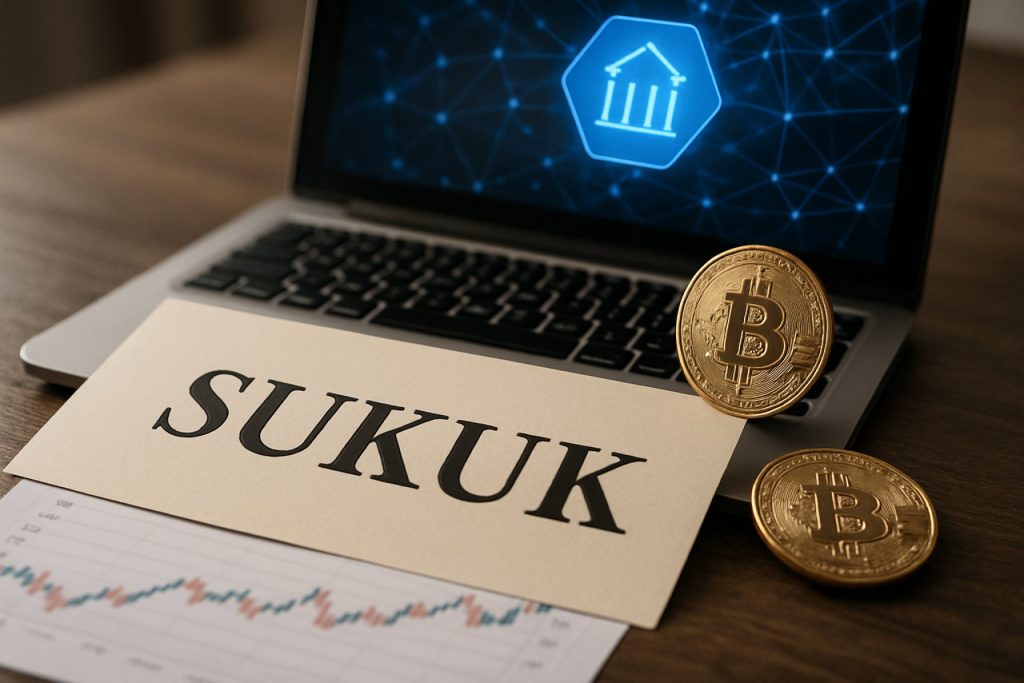
How Sukuk Blockchain Tokenization Platforms Are Revolutionizing Islamic Finance in 2025: Unveiling Market Growth, Technology Trends, and the Road Ahead
- Executive Summary: Key Findings and Market Highlights
- Market Size and Growth Forecast (2025–2030)
- Drivers and Challenges in Sukuk Tokenization Adoption
- Regulatory Landscape and Shariah Compliance
- Technology Architecture: Blockchain Protocols and Smart Contracts
- Competitive Landscape: Leading Platforms and Ecosystem Players
- Case Studies: Live Sukuk Tokenization Projects (2023–2025)
- Investor Perspectives and Institutional Adoption
- Future Trends: Interoperability, CBDCs, and Cross-Border Sukuk
- Strategic Recommendations and Outlook for 2030
- Sources & References
Executive Summary: Key Findings and Market Highlights
The market for Sukuk blockchain tokenization platforms is entering a pivotal phase in 2025, marked by accelerating adoption, regulatory engagement, and technological innovation. Sukuk, as Shariah-compliant financial instruments, are increasingly being digitized and tokenized on blockchain infrastructures to enhance transparency, efficiency, and global accessibility. This transformation is being driven by both established financial institutions and fintech startups, with significant pilot projects and commercial launches observed across the Middle East, Southeast Asia, and Europe.
Key findings indicate that tokenized Sukuk issuance volumes are expected to grow substantially in 2025, building on successful pilots and early-stage offerings in previous years. Notably, the Abu Dhabi Securities Exchange (ADX) and the Bahrain Bourse have both announced initiatives to facilitate digital Sukuk trading and settlement using distributed ledger technology. In Malaysia, a global leader in Islamic finance, the Bursa Malaysia has partnered with technology providers to explore blockchain-based Sukuk issuance, aiming to streamline processes and attract international investors.
Several technology firms are at the forefront of this evolution. R3, a leading enterprise blockchain software company, has collaborated with Islamic banks and regulators to develop tokenization frameworks that comply with Shariah principles. Similarly, ConsenSys has provided Ethereum-based solutions for digital asset issuance, including Sukuk, focusing on programmability and interoperability. In the Gulf region, Emaratech and Abu Dhabi Global Market (ADGM) are supporting regulatory sandboxes and pilot projects to test blockchain-based Sukuk platforms in real-world environments.
Regulatory bodies are increasingly proactive, with the Securities and Commodities Authority (UAE) and Securities Commission Malaysia issuing guidelines and frameworks for digital securities, including Sukuk. These efforts are expected to lower barriers for cross-border issuance and secondary market trading, addressing longstanding liquidity and settlement challenges in the Sukuk market.
Looking ahead, the outlook for Sukuk blockchain tokenization platforms is robust. Market participants anticipate a surge in both primary issuance and secondary trading volumes, driven by institutional adoption and supportive regulatory environments. The convergence of Islamic finance and blockchain technology is poised to unlock new capital flows, democratize access to Sukuk investments, and set new standards for transparency and efficiency in the global Islamic capital markets.
Market Size and Growth Forecast (2025–2030)
The market for Sukuk blockchain tokenization platforms is poised for significant expansion between 2025 and 2030, driven by the convergence of Islamic finance principles and digital asset innovation. Sukuk, as Shariah-compliant financial instruments, have traditionally relied on conventional issuance and trading mechanisms. However, the adoption of blockchain technology is transforming this landscape, enabling greater transparency, efficiency, and accessibility for issuers and investors alike.
By 2025, several pioneering platforms are expected to be operational, with early movers such as Abu Dhabi Global Market (ADGM) and Bahrain FinTech Bay supporting regulatory sandboxes and pilot projects for tokenized Sukuk. In 2023, the Abu Dhabi Global Market facilitated the issuance of blockchain-based Sukuk, setting a precedent for the region and signaling institutional readiness for digital asset adoption. Similarly, Bahrain FinTech Bay has fostered partnerships with fintech startups to explore Shariah-compliant tokenization solutions.
The market size for tokenized Sukuk platforms is projected to grow rapidly as more jurisdictions in the Gulf Cooperation Council (GCC), Southeast Asia, and beyond embrace digital finance. The total value of Sukuk outstanding globally surpassed $800 billion in 2023, with the Islamic Development Bank and sovereign issuers in Malaysia, Saudi Arabia, and the UAE leading issuance volumes. Even a modest shift—such as 5–10% of new Sukuk issuances being tokenized by 2025—could translate into tens of billions of dollars in digital asset flows through these platforms.
Key technology providers and consortia are emerging to serve this market. R3, a leading enterprise blockchain software firm, has collaborated with Islamic finance institutions to develop tokenization frameworks that comply with Shariah principles. Meanwhile, Sygnum Bank, a digital asset bank, has announced its intent to support tokenized Islamic financial products, including Sukuk, on its regulated platform. These developments are expected to catalyze further institutional participation and cross-border investment.
Looking ahead to 2030, the outlook for Sukuk blockchain tokenization platforms is robust. Regulatory clarity is improving, with authorities in the UAE, Bahrain, and Malaysia issuing guidelines for digital assets and tokenized securities. As interoperability standards mature and secondary market liquidity deepens, the market is likely to see exponential growth, with tokenized Sukuk platforms capturing a significant share of new issuances and facilitating global investor access to Islamic finance products.
Drivers and Challenges in Sukuk Tokenization Adoption
The adoption of blockchain tokenization platforms for sukuk issuance is gaining momentum in 2025, driven by a confluence of technological, regulatory, and market factors. Sukuk, as Shariah-compliant financial instruments, have traditionally faced challenges related to transparency, settlement efficiency, and cross-border accessibility. Blockchain-based tokenization platforms are positioned to address these issues, but their widespread adoption is shaped by both drivers and challenges.
Key Drivers
- Operational Efficiency and Transparency: Blockchain platforms enable real-time settlement, immutable record-keeping, and automated compliance checks through smart contracts. This reduces operational costs and mitigates risks of manual errors. For example, Abu Dhabi Global Market (ADGM) has supported pilot sukuk tokenization projects, highlighting the potential for streamlined issuance and lifecycle management.
- Broader Investor Access: Tokenization allows fractional ownership, making sukuk accessible to a wider pool of investors, including retail and international participants. Platforms such as Sygnum Bank and SIX Digital Exchange have demonstrated the ability to onboard diverse investors through regulated digital asset marketplaces.
- Regulatory Support and Sandbox Initiatives: Regulatory bodies in key Islamic finance hubs, including the Securities Commission Malaysia and Dubai Financial Services Authority, are actively developing frameworks and sandboxes to facilitate digital sukuk experimentation, providing legal clarity and fostering innovation.
- Cross-Border Settlement: Blockchain’s interoperability can simplify cross-border sukuk transactions, reducing settlement times from days to minutes and lowering costs, as seen in pilot projects supported by Abu Dhabi Global Market and other regional authorities.
Key Challenges
- Regulatory Fragmentation: Despite progress, regulatory approaches to digital assets and tokenized securities remain inconsistent across jurisdictions. This creates legal uncertainty for cross-border sukuk issuance and secondary trading.
- Shariah Compliance Assurance: Ensuring that smart contracts and tokenization processes adhere to Shariah principles requires ongoing oversight by qualified scholars, and the lack of standardized digital Shariah governance frameworks can slow adoption.
- Technology Integration and Legacy Systems: Many financial institutions still rely on legacy infrastructure, making integration with blockchain platforms complex and costly. Interoperability between traditional and digital systems is a persistent technical hurdle.
- Market Education and Trust: Both issuers and investors require education on the benefits and risks of tokenized sukuk. Building trust in new digital platforms, especially in conservative markets, remains a gradual process.
Looking ahead, the outlook for sukuk blockchain tokenization platforms is positive, with increasing pilot projects and regulatory engagement expected to drive adoption. However, harmonizing regulations, establishing robust Shariah-compliant digital frameworks, and fostering industry collaboration will be critical to overcoming current challenges and unlocking the full potential of tokenized sukuk in the coming years.
Regulatory Landscape and Shariah Compliance
The regulatory landscape for Sukuk blockchain tokenization platforms is rapidly evolving as both financial authorities and Shariah boards seek to address the unique challenges and opportunities presented by distributed ledger technology (DLT) in Islamic finance. As of 2025, several jurisdictions with established Islamic finance sectors—such as the United Arab Emirates, Malaysia, and Bahrain—are actively developing or refining frameworks to accommodate tokenized Sukuk issuance, trading, and settlement.
In the United Arab Emirates, the Abu Dhabi Global Market (ADGM) and the Dubai International Financial Centre (DIFC) have both introduced digital asset regulations that explicitly consider the tokenization of securities, including Sukuk. These frameworks require platforms to obtain appropriate licenses, implement robust anti-money laundering (AML) and know-your-customer (KYC) procedures, and ensure that tokenized instruments comply with both conventional and Shariah financial regulations. The ADGM, in particular, has positioned itself as a hub for digital securities, supporting pilot projects and sandboxes for blockchain-based Sukuk issuance.
Malaysia, a global leader in Islamic finance, has seen its Securities Commission (SC) issue guidelines for digital asset offerings and digital asset exchanges, which are applicable to tokenized Sukuk. The SC’s regulatory sandbox has enabled fintech firms to test blockchain-based Sukuk platforms under regulatory supervision, ensuring that Shariah compliance is maintained throughout the lifecycle of the instrument. The Bank Negara Malaysia and the SC have also collaborated with Shariah advisory councils to provide clarity on the permissibility of smart contracts and digital asset custody in the context of Islamic finance.
Bahrain’s Central Bank of Bahrain (CBB) has issued comprehensive crypto-asset regulations, and its regulatory sandbox has hosted several blockchain Sukuk pilots. The CBB’s approach emphasizes the need for Shariah-compliant governance structures and transparent asset backing for tokenized Sukuk, aligning with AAOIFI (Accounting and Auditing Organization for Islamic Financial Institutions) standards.
Shariah compliance remains a central concern for tokenized Sukuk platforms. Leading blockchain-based Sukuk issuers and technology providers, such as Sukuk.com and Injazat, are working closely with Shariah scholars to develop smart contracts that automate compliance checks, profit distribution, and asset management in accordance with Islamic principles. These platforms often integrate real-time auditing and reporting features to facilitate ongoing Shariah supervision.
Looking ahead, the outlook for regulatory harmonization and Shariah standardization in blockchain Sukuk is positive. Regional and international bodies, including the AAOIFI and the Islamic Financial Services Board (IFSB), are expected to issue further guidance on digital asset tokenization and smart contract use in Islamic capital markets. As regulatory clarity improves and more Shariah-compliant blockchain platforms are launched, the adoption of tokenized Sukuk is likely to accelerate, offering enhanced transparency, efficiency, and global accessibility for issuers and investors alike.
Technology Architecture: Blockchain Protocols and Smart Contracts
The technology architecture underpinning Sukuk blockchain tokenization platforms in 2025 is characterized by the convergence of advanced distributed ledger technologies (DLT), robust smart contract frameworks, and compliance-driven digital asset standards. These platforms are designed to digitize and fractionalize Sukuk—Islamic financial certificates—enabling greater liquidity, transparency, and accessibility in Shariah-compliant capital markets.
A central component of these platforms is the choice of blockchain protocol. Permissioned blockchains, such as Hyperledger Fabric and Corda, are favored by many financial institutions for their privacy, scalability, and regulatory alignment. For example, R3’s Corda is widely adopted in the financial sector for its ability to facilitate confidential transactions and complex workflow automation, making it suitable for Sukuk issuance and lifecycle management. Meanwhile, public blockchains like Ethereum are also utilized, particularly when interoperability and broader investor participation are priorities. Ethereum’s ERC-1400 standard, which supports security tokens with compliance features, is increasingly referenced in tokenized Sukuk pilots.
Smart contracts are the backbone of Sukuk tokenization, automating the issuance, distribution, profit-sharing, and redemption processes. These self-executing contracts are programmed to enforce Shariah compliance, ensuring that profit calculations, asset backing, and risk-sharing mechanisms adhere to Islamic finance principles. Leading technology providers, such as Sygnum and Stellar Development Foundation, have developed modular smart contract templates that can be customized for various Sukuk structures, including Ijara, Mudarabah, and Wakalah.
Interoperability and integration with existing financial infrastructure are also key architectural considerations. Platforms are increasingly adopting tokenization standards that facilitate cross-chain compatibility and seamless settlement with traditional systems. For instance, Abu Dhabi Global Market (ADGM) has supported initiatives that leverage blockchain for digital Sukuk, emphasizing the need for regulatory-compliant, interoperable solutions.
Looking ahead, the outlook for Sukuk blockchain tokenization platforms is shaped by ongoing advancements in zero-knowledge proofs, on-chain identity verification, and regulatory technology (RegTech) integration. These innovations are expected to further enhance privacy, compliance, and scalability, paving the way for broader adoption by sovereign issuers, financial institutions, and retail investors. As the ecosystem matures, collaboration between technology providers, Islamic finance authorities, and regulators will be critical to standardizing protocols and ensuring the integrity of tokenized Sukuk offerings.
Competitive Landscape: Leading Platforms and Ecosystem Players
The competitive landscape for Sukuk blockchain tokenization platforms is rapidly evolving as financial institutions, fintech startups, and technology providers seek to modernize Islamic finance instruments. As of 2025, several key players are shaping the market by leveraging distributed ledger technology (DLT) to enhance transparency, efficiency, and accessibility in Sukuk issuance and trading.
One of the most prominent platforms is Abu Dhabi Global Market (ADGM), which has established itself as a leading regulatory and innovation hub for digital securities in the Middle East. ADGM’s digital lab and regulatory sandbox have enabled multiple pilot projects for blockchain-based Sukuk, attracting both regional banks and global technology partners. In 2023, ADGM facilitated the issuance of blockchain-based Sukuk by regional banks, demonstrating the viability of tokenized Islamic securities within a regulated environment.
Another significant player is Singapore Exchange (SGX), which has collaborated with regional Islamic banks and fintech firms to explore tokenized Sukuk on its digital asset platform. SGX’s experience in digital bond issuance and its robust regulatory framework make it a preferred venue for cross-border Sukuk tokenization, particularly for issuers targeting Southeast Asian and Middle Eastern investors.
In the Gulf region, Dubai International Financial Centre (DIFC) and its innovation arm have supported several blockchain initiatives focused on Islamic finance. DIFC’s ecosystem includes fintech accelerators and partnerships with blockchain technology providers, fostering the development of platforms that enable the issuance, trading, and lifecycle management of Sukuk as digital tokens.
On the technology side, R3 has emerged as a key infrastructure provider, with its Corda platform being adopted by financial institutions for the tokenization of Islamic financial instruments, including Sukuk. R3’s partnerships with Middle Eastern banks and regulators have resulted in pilot projects and proofs-of-concept that demonstrate the interoperability and compliance of tokenized Sukuk with Shariah principles.
Looking ahead, the competitive landscape is expected to intensify as more jurisdictions introduce regulatory frameworks for digital assets and as interoperability between platforms improves. The entry of global technology firms and the growing involvement of established Islamic banks are likely to accelerate adoption. By 2027, industry observers anticipate that tokenized Sukuk platforms will become integral to the global Islamic capital markets, offering enhanced liquidity, broader investor access, and streamlined post-trade processes.
Case Studies: Live Sukuk Tokenization Projects (2023–2025)
Between 2023 and 2025, the landscape of sukuk blockchain tokenization has shifted from pilot projects to live, regulated offerings, with several platforms and financial institutions launching real-world tokenized sukuk issuances. These case studies highlight the growing maturity and adoption of blockchain in Islamic finance, particularly in the Gulf Cooperation Council (GCC) and Southeast Asia.
One of the most prominent examples is the partnership between the Islamic Development Bank (IsDB) and blockchain technology provider SETL. In 2023, IsDB successfully piloted a blockchain-based platform for issuing and managing sukuk, aiming to enhance transparency, reduce costs, and improve access for a broader investor base. The platform leverages SETL’s permissioned blockchain infrastructure, enabling the digital representation of sukuk assets and automating compliance with Shariah principles. The IsDB’s initiative is seen as a blueprint for other multilateral development banks and sovereign issuers considering blockchain for Islamic capital markets.
In the private sector, HSBC has played a pioneering role. In late 2023, HSBC, in collaboration with the Dubai Financial Market (DFM), facilitated the issuance of a fully digital, blockchain-based sukuk for a UAE-based corporate client. The project utilized smart contracts to automate profit distribution and lifecycle management, significantly reducing settlement times and operational risks. HSBC’s involvement underscores the willingness of global banks to support digital Islamic securities and signals a shift toward mainstream adoption.
Malaysia, a global leader in Islamic finance, has also seen live deployments. Maybank launched a pilot in 2024, issuing tokenized sukuk on a private blockchain network. The project, developed in partnership with local fintechs, focused on retail investors, offering fractionalized sukuk units with lower minimum investment thresholds. This democratization of access is expected to drive broader participation in sukuk markets, especially among younger, tech-savvy investors.
Looking ahead to 2025, several platforms are scaling up. Abu Dhabi Global Market (ADGM) has established a regulatory sandbox for digital sukuk, attracting fintech startups and established banks to test and launch tokenized offerings. The sandbox provides a controlled environment for innovation, with a focus on cross-border interoperability and compliance with both Shariah and international securities regulations.
These live projects demonstrate that blockchain tokenization of sukuk is moving beyond experimentation. The next few years are likely to see increased issuance volumes, broader investor participation, and deeper integration with global capital markets, as regulatory clarity and technological maturity continue to advance.
Investor Perspectives and Institutional Adoption
Investor perspectives on sukuk blockchain tokenization platforms are rapidly evolving as institutional adoption accelerates in 2025. The integration of blockchain technology into sukuk issuance and trading is seen as a transformative step, promising enhanced transparency, efficiency, and accessibility for both issuers and investors. Institutional investors, including Islamic banks, sovereign wealth funds, and asset managers, are increasingly exploring tokenized sukuk as a means to diversify portfolios and access new markets.
A key driver of this trend is the successful deployment of blockchain-based sukuk platforms by major financial institutions and technology providers. For example, HSBC has been actively involved in digital bond and sukuk initiatives, leveraging distributed ledger technology to streamline issuance and settlement processes. Similarly, Abu Dhabi Global Market (ADGM) has positioned itself as a leading regulatory hub for digital securities, supporting pilot projects and regulatory sandboxes for tokenized sukuk. These efforts have attracted institutional investors seeking compliant and efficient access to Shariah-compliant assets.
In 2024 and early 2025, several high-profile tokenized sukuk issuances have demonstrated growing institutional confidence. For instance, Bahrain’s Regulatory Sandbox has enabled fintech firms to launch blockchain-based sukuk platforms, facilitating cross-border investment and secondary market liquidity. The involvement of established Islamic finance players, such as Maybank and CIMB, in pilot projects and consortia further signals mainstream acceptance.
From the investor perspective, the appeal of tokenized sukuk lies in fractional ownership, real-time settlement, and improved transparency. Blockchain platforms enable investors to track underlying assets and cash flows, reducing operational risks and costs. Additionally, tokenization opens sukuk markets to a broader range of investors, including those previously excluded due to high minimum investment thresholds or geographic barriers.
Looking ahead, institutional adoption is expected to accelerate as regulatory frameworks mature and interoperability between platforms improves. Initiatives by organizations such as International Islamic Financial Market (IIFM) to standardize digital sukuk structures are likely to further boost investor confidence. As more sovereign and corporate issuers embrace blockchain tokenization, the sukuk market is poised for increased liquidity, global participation, and innovation in product offerings through 2025 and beyond.
Future Trends: Interoperability, CBDCs, and Cross-Border Sukuk
The landscape of sukuk blockchain tokenization platforms is rapidly evolving, with 2025 poised to be a pivotal year for the integration of interoperability, central bank digital currencies (CBDCs), and cross-border issuance. As Islamic finance seeks to modernize, the convergence of these trends is expected to reshape how sukuk are structured, issued, and traded globally.
A key driver is the push for interoperability among blockchain networks. Most sukuk tokenization platforms have historically operated on isolated blockchains, limiting liquidity and cross-border participation. In 2025, leading platforms are prioritizing interoperability protocols to enable seamless transfer and settlement of tokenized sukuk across different distributed ledger technologies (DLTs). For example, ConsenSys—a major Ethereum software company—has been collaborating with financial institutions in the Middle East to develop cross-chain solutions that facilitate the movement of digital assets, including sukuk, between private and public blockchains. This is expected to lower barriers for international investors and enhance secondary market activity.
The integration of CBDCs is another transformative trend. Several central banks in the Gulf Cooperation Council (GCC) and Southeast Asia are piloting or planning CBDC projects, with a focus on supporting Shariah-compliant financial instruments. The ability to settle sukuk transactions in real-time using CBDCs could significantly reduce counterparty risk and operational costs. In 2025, platforms such as those developed by R3—a global enterprise blockchain technology firm—are expected to offer native support for CBDC settlement, aligning with ongoing initiatives by central banks in the UAE and Saudi Arabia. This integration is anticipated to streamline cross-border sukuk issuance and settlement, making the process more efficient and transparent.
Cross-border sukuk issuance is set to benefit from these technological advancements. Tokenization platforms are increasingly being designed to comply with multiple regulatory frameworks, enabling issuers to tap into a broader investor base. Abu Dhabi Global Market (ADGM) has emerged as a leading jurisdiction, providing a regulatory sandbox for digital sukuk and fostering partnerships between fintechs and Islamic banks. In 2025 and beyond, the adoption of standardized smart contracts and digital identity solutions is expected to further facilitate cross-border offerings, reducing friction and enhancing trust among participants.
Looking ahead, the convergence of interoperability, CBDCs, and regulatory harmonization is likely to accelerate the global adoption of sukuk blockchain tokenization platforms. As these technologies mature, they are expected to unlock new liquidity pools, lower issuance costs, and make sukuk more accessible to both institutional and retail investors worldwide.
Strategic Recommendations and Outlook for 2030
The strategic outlook for Sukuk blockchain tokenization platforms through 2030 is shaped by accelerating digital transformation in Islamic finance, regulatory evolution, and the growing appetite for Shariah-compliant digital assets. As of 2025, several pioneering initiatives and platforms are setting the stage for broader adoption, with key players including Abu Dhabi Global Market (ADGM), Singapore Exchange (SGX), and Central Bank of Bahrain (CBB) actively piloting or supporting blockchain-based Sukuk issuance.
Strategically, stakeholders should prioritize interoperability and regulatory alignment. The ADGM, for example, has established a digital lab and regulatory sandbox to facilitate the development and testing of tokenized Sukuk, fostering collaboration between fintechs, banks, and Shariah scholars. This approach is expected to become a blueprint for other jurisdictions seeking to balance innovation with compliance. Similarly, the CBB’s regulatory sandbox has enabled the launch of tokenized Sukuk pilots, demonstrating the feasibility of blockchain for primary issuance and secondary trading of Islamic securities.
By 2025, the Singapore Exchange has already completed successful trials of blockchain-based bond and Sukuk issuance, leveraging distributed ledger technology to streamline settlement and enhance transparency. These pilots have shown that tokenization can reduce issuance costs, shorten settlement cycles, and improve access for a broader investor base. As these benefits become more widely recognized, it is anticipated that more financial institutions in the Gulf Cooperation Council (GCC) and Southeast Asia will partner with technology providers to launch their own platforms.
Looking toward 2030, the outlook is for exponential growth in tokenized Sukuk volumes, driven by increasing institutional participation and cross-border collaboration. Strategic recommendations for stakeholders include:
- Engage proactively with regulators and Shariah boards to ensure that tokenized Sukuk structures remain compliant and secure.
- Invest in scalable, interoperable blockchain infrastructure to facilitate cross-border issuance and trading, leveraging open standards where possible.
- Foster partnerships between Islamic banks, fintechs, and technology providers to accelerate platform development and market education.
- Prioritize cybersecurity and investor protection, as digital asset markets remain a target for sophisticated threats.
By 2030, tokenized Sukuk are expected to become a mainstream instrument in Islamic capital markets, with platforms operated or supported by leading financial centers such as Abu Dhabi Global Market, Singapore Exchange, and Central Bank of Bahrain playing pivotal roles in shaping global standards and best practices.
Sources & References
- Abu Dhabi Securities Exchange
- Bahrain Bourse
- R3
- ConsenSys
- Emaratech
- Abu Dhabi Global Market
- Securities and Commodities Authority
- Securities Commission Malaysia
- Bahrain FinTech Bay
- SIX Digital Exchange
- Dubai International Financial Centre (DIFC)
- Central Bank of Bahrain (CBB)
- Sukuk.com
- Injazat
- AAOIFI
- Islamic Financial Services Board (IFSB)
- Stellar Development Foundation
- SETL
- HSBC
- Maybank
- HSBC
- Maybank
- International Islamic Financial Market (IIFM)
- ConsenSys
- R3



